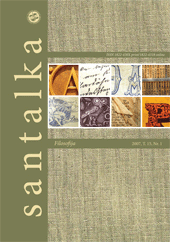Theological Hermeneutics: Interpreting “The Lost Garden of Immediacy”
Theological Hermeneutics: Interpreting “The Lost Garden of Immediacy”
Author(s): Mindaugas BriedisSubject(s): Philosophy
Published by: Vilnius Gediminas Technical University
Keywords: language; hermeneutics; theology; ontology; analogy.
Summary/Abstract: Contemporary hermeneutics has turned from the art of textual interpretation to the world – constitutive functions of language and symbolic representation. It is stressed that all understanding takes place within horizons constituted by history and language. Building on the ultimate religious foundations of divinely revealed truth, theological hermeneutics reflects upon theology as the site of a circular mediation of Scripture, tradition, and culture. The guiding question of this article is: can a theological hermeneutics retranslate philosophical sources into the language of theology? For these purposes we must at first situate the theological phenomenon of Verbum at the center of philosophical hermeneutics. Secondly, it is necessary to give a brief account of how symbols (all in general and some in particular) function in religious language. Also, we can see that in the face of the dawn of some traditional religious symbols, we can find new ones emerging from new strategies of theological hermeneutics in the face of new ontology. The analysis of symbolic nature of theological hermeneutics directs us to the question of analogy. Eventually the subject of investigations turns to be “validity” of analogical language in theological hermeneutics, which have some paradoxical consequences. On the other hand, it is clear that these paradoxes are not simply about formal matters. It is amazing that the basic symbol functioning in analogical language for expressing the proper language of God-talk (theology) is the language itself.
Journal: Santalka: Filologija, Edukologija
- Issue Year: 15/2007
- Issue No: 1
- Page Range: 25-36
- Page Count: 12
- Language: English

